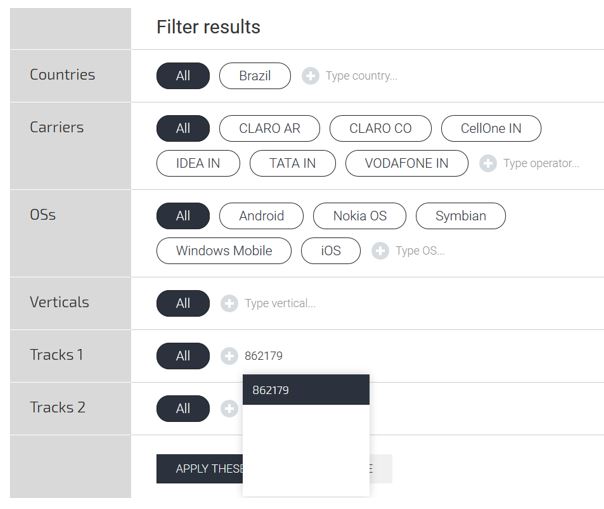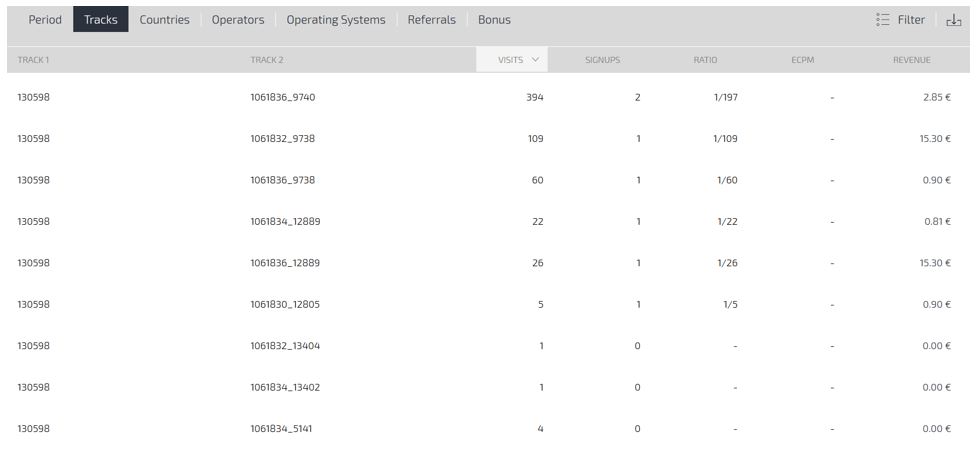Dynamic Tracking: Don’t Lose Track of Your Performance
Last updated on May 4, 2018 by André Martins 4 min readEditor’s Note: This is a section of our Media Buying Guide – Semi Advanced. Check it out!
Introduction
The main purpose of this article is to understand the importance of tracking your activity and learn to implement dynamic tracking.
You can work with your offer links in order to manage your data and set how you want to see them on your platform.
Setting up your links correctly will increase your accuracy and effectiveness as they will give you more info.
Dynamic Tracking
A dynamic tracking is a parameter that’s automatically replaced by the ad networks after each click/impression with the info you’re looking for.
For example, let’s consider you use a dynamic tracking to receive the info about the website {websitename}.
When your banner is clicked or your pop appears, this parameter will automatically be changed for the name of the website.
You can use it to know the website or any other campaign and user characteristic.
How will you set up your links?
It all depends on where they’ll run.
Each ad network has specific tracking tokens to recognize your data.
Implement Dynamic Tracking
To set your smartlink, after gathering the dynamic trackings for your specific ad network, you must replace the original tracking parameters:
http://www.example.com/?sl=12345&data1=Track1&data2=Track2
Check the next outputs on Mobidea with and without dynamic trackings:
Without Dynamic Tracking:
http://www.example.com/?sl=12345&data1=Track1&data2=Track2
In the first columns (Track1 and Track2) we’ll receive the info provided by the smartlink.
If we didn’t set the dynamic tracking, for each click, we’ll receive data1=Track1 and data2=Track2.
That means that, in this case, all we get is Track 1 and Track 2 on our stats, which is useless.
With Dynamic Tracking (ExoClick’s dynamic tracking):
http://www.example.com/?sl=12345&data1={campaign_id}&data2={src_hostname}
In this example, you can see the output from a smartlink set for Exoclick.
In this smartlink we set:
Data1 = {campaign_id} – will provide the campaign ID
Data2 = {src_hostname} – will provide the website’s domain where the click was done
In the image below, it’s easy to understand the main advantage of setting dynamic tracking properly.
In fact, you can easily see the costs (in the adnetwork) as well as the earnings for each one (in this case, on Mobidea).
In the “Filter” option, you can insert the campaign ID in Track1 and Mobidea will display only the campaign stats.
We just got the possibility of tracking our performance much better, increasing the accuracy of our analysis.
For each campaign, we can understand the performance per website, banners, operators, operating systems, etc.
Setting dynamic tracking for AdXpansion
http://www.example.com/?sl=12345&data1={adgroupID}&data2={creativeID}_{zone}
In this case the output shows:
Data 1 = {adgroupID} – will provide information about the campaign ID
Data2 = {creativeID}_{zone} – will provide information about the banner ID and also the website ID.
Most Affiliate Networks will show the data in one or two columns only.
If you need to track more than two parameters, you can integrate them in the same Track and divide them with a symbol: (_) for example.
If you have a lot of data, thanks to this “splitter”, you can work it on an Excel file and use the “Text to columns” tool.
Then, everything will be split in different columns and it’ll be easier for you to work.
Keep in mind that there are lots of different Dynamic Trackings:
Adzone, Timestamp, Price, etc.
It all depends on what you think is most important when optimizing your campaigns.
Conclusion
Although we’ve written this article, this isn’t enough.
You should always contact the support or your account manager to check if everything looks good and is set properly.
I hope this article opens up different perspectives and helps you on your media buying activity.
Any questions left? Please contact us by email (support@mobidea.com) or skype (support.mobidea).
Cheers!

André Martins
Business Intelligence Team Member
André Martins joined Mobidea in 2015. He comes from a scientific area so numbers and analytical power are two of his stronger skills. He began as a Media Buyer and Account Manager for Spanish-speaking VIP affiliates. He came about when social traffic was only at its early stages, and he honed the role like a pro. André became a true expert on social traffic. In the second half of 2016, a new independent team was created on Mobidea: the Social Marketing team. The strong analytical skills and the media buying/business experience make André a great expert on the subject. Apart from working, André has many different passions. He really loves Astrophysics (where he managed to get a PhD) and he is a History buff. He loves travelling. He also enjoys watching movies with his loved one and sports are a great source of fun in his life! Playing football, hiking and cycling are three things that make André really happy!
There are many tools a Media Buyer can use to track their performance. Check the best ones and start making it rain!
CPM vs CPC? Who's gonna win this fight? Learn about the different price models and take your pick in this Mobidea Academy post!
Media buying tips that help you understand what you've gotta do to succeed in the media buying business and which will increase your revenue to boot!







